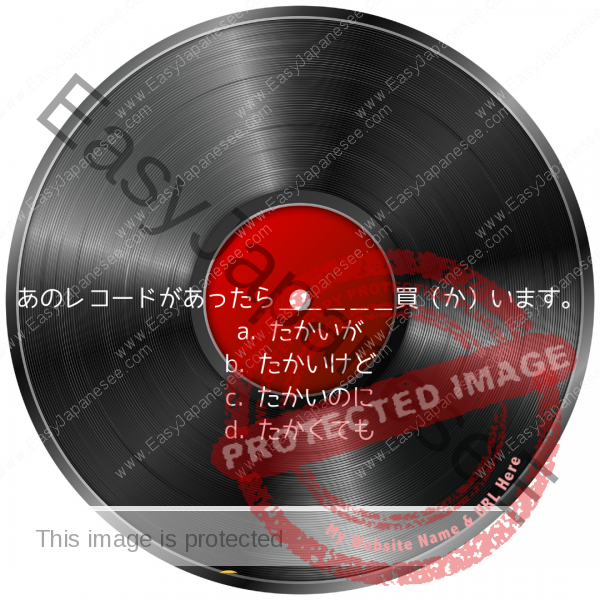
あのレコードがあったら_____買(か)います。
a. たかいが
b. たかいけど
c. たかいのに
d. たかくても
Today’s topic is an adversative conjunction, [てform]+も, which is usually translated as “even if”.
All of the above choices include an adversative conjunction (a conjunction that connects contrasting/opposite parts) but in this example only d. たかくても can be used.
Why?
あのレコードがあったら、高くても買います means “If (a shop) has that record, I will buy it even if it’s expensive.” In this situation, the record being expensive is only an assumption, not a fact, because あのレコードがあったら suggests that they (shop) may not have it, and [てform]+も is the only one here which can be used with an assumption.
Some more examples of similar use:
<verb>
あめがふっても、10キロはしる。
Even if it rains, I will run 10 km.さがしてもみつからないだろう。
Even if you look for it, you won’t find it.みつからなくても しかたがない。
It can’t be helped even if it is not found.<いadjective>
むずかしくても がんばる。
I’ll do my best even if it is difficult.おいしくなくても たべる。
I’ll eat it even if it is not delicious.<なadjective>
さしみは しんせんでも たべない。
Even if sashimi is fresh, I won’t eat it.まじめじゃなくても だいじょうぶです。
It is OK even if he is not studious.
If the sentence did not have あのレコードがあったら, all other 3 sentences make sense and they mean:
a. たかいが 買(か)います。It is expensive but I will buy it.
b. たかいけど 買(か)います。Although it is expensive, I will buy it (almost the same with the above)
c. たかいのに 買(か)います。Even though it is expensive, I will buy it. (not much difference from the above 2)
![[てform]+も](https://www.easyjapanesee.com/wp-content/uploads/2020/06/200625-takakutemo.png)

One Reply to “[てform]+も”